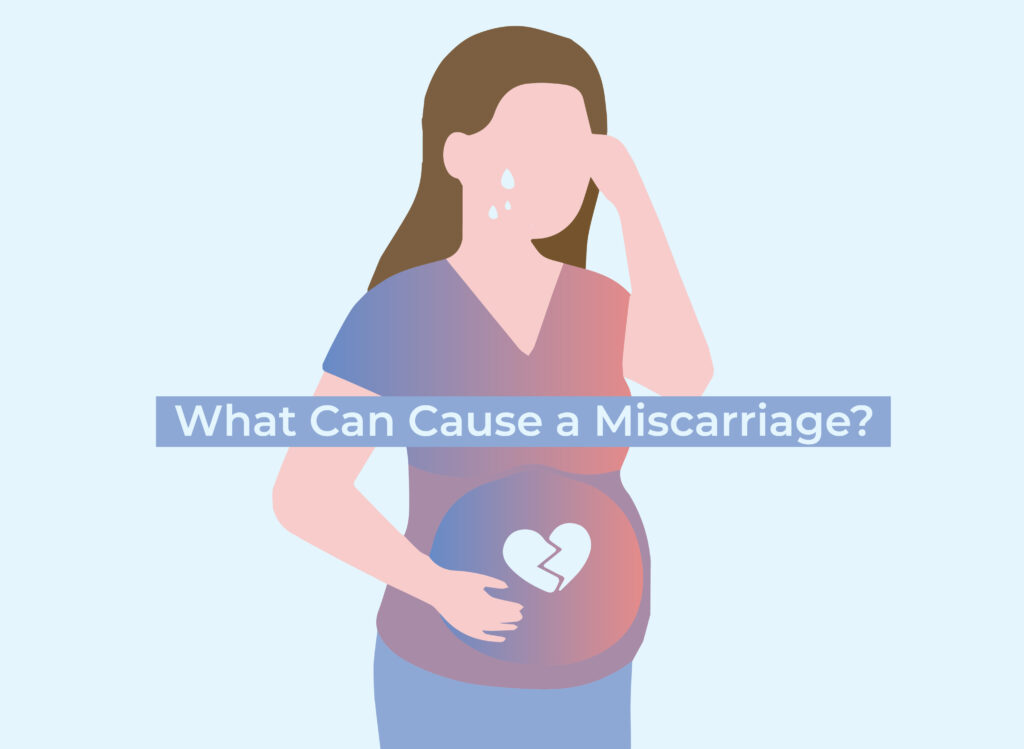Understanding Miscarriages
Miscarriage is an unfortunate event that affects many expectant parents. Understanding the factors that contribute to a miscarriage is essential for preventing and managing this challenging situation. In this comprehensive guide, we’ll explore what can cause a miscarriage, dispel common myths, and provide tips for a healthy pregnancy.

What Can Cause a Miscarriage
Chromosomal Abnormalities
A primary cause of miscarriage is chromosomal abnormalities in the developing fetus. Genetic issues can arise from either parent or a combination of both, resulting in an embryo that cannot develop properly. Sometimes, miscarriages due to chromosomal abnormalities are the result of random events during cell division. These occurrences are unpredictable and may not affect future pregnancies.
Lifestyle Factors
Smoking increases the risk of miscarriage significantly. Toxins in cigarette smoke can harm the developing fetus and increase the likelihood of complications during pregnancy. Drinking alcohol during pregnancy can lead to miscarriage and other pregnancy-related issues. It’s best to avoid alcohol entirely while pregnant. Recreational drug use is another factor that can increase the risk of miscarriage. Expectant parents should avoid using illicit substances during pregnancy.
Health Conditions
Uncontrolled diabetes increases the risk of miscarriage. Proper management of blood sugar levels is crucial for a healthy pregnancy. Imbalances in thyroid hormone levels can also contribute to miscarriage. It’s important for pregnant women to have their thyroid levels checked and managed. Certain autoimmune diseases, such as lupus or antiphospholipid syndrome, can increase the risk of miscarriage. Proper management of these conditions is essential to minimize risks during pregnancy.
Infections
Some bacterial infections, like listeria or syphilis, can lead to miscarriage if left untreated. Pregnant women should consult with their healthcare provider if they suspect an infection. Certain viral infections, such as rubella or cytomegalovirus, can also cause miscarriage. Practicing good hygiene and staying up-to-date on vaccinations can help prevent these infections.
Environmental Factors
Exposure to harmful chemicals or radiation can increase the risk of miscarriage. Expectant parents should be cautious of their environment and avoid exposure to hazardous substances. Severe physical trauma, such as a car accident or fall, can lead to miscarriage. Pregnant women should take extra precautions to minimize the risk of injury.
Age-Related Factors
Women over the age of 35 have a higher risk of miscarriage due to age-related declines in egg quality and other factors. Advanced paternal age can also contribute to miscarriage, as sperm quality declines with age.
Psychological Factors
High levels of stress may contribute to miscarriage, although the connection is not entirely understood. Managing stress is essential for a healthy pregnancy.
Uterine or Cervical Issues
An abnormally shaped uterus can make it difficult for an embryo to implant, increasing the risk of miscarriage. An incompetent cervix, or a cervix that opens prematurely, can also lead to miscarriage in the second trimester.
FAQs
How common are miscarriages?
- Miscarriages occur in approximately 10-20% of known pregnancies, making them relatively common. However, many miscarriages occur before a woman even realizes she is pregnant, so the actual number may be higher.
Can exercise cause a miscarriage?
- Moderate exercise is generally safe during pregnancy and does not typically cause miscarriage. However, overexertion or high-impact activities may increase the risk. Pregnant women should consult their healthcare provider before starting any exercise regimen.
Are miscarriages hereditary?
- Some genetic factors can increase the risk of miscarriage, but it is not necessarily hereditary. Each pregnancy is unique, and a history of miscarriage in the family does not guarantee the same outcome for others.
Can stress cause a miscarriage?
- The relationship between stress and miscarriage is not entirely clear, but high levels of stress may contribute to the risk. Managing stress is essential for a healthy pregnancy.
Is it possible to prevent a miscarriage?
- While it is not possible to prevent all miscarriages, certain lifestyle changes and proper management of health conditions can help minimize the risk. Maintaining a healthy lifestyle, avoiding smoking and alcohol, and addressing any pre-existing medical conditions are essential steps in minimizing the risk of miscarriage.
What are the signs of a miscarriage?
- Common signs of a miscarriage include bleeding, cramping, and a sudden decrease in pregnancy symptoms. However, some miscarriages may not have any noticeable symptoms. If you suspect a miscarriage, contact your healthcare provider immediately.
Conclusion
We aim to bring you the best fertility information, but understand that each person’s journey is singular. This guidance is general and may not be specific to your situation. Always talk to a licensed medical professional for advice tailored to your health and needs.
Fertility can be naturally supported through various avenues, beyond medical treatments. Stress reduction, healthy eating, consistent physical activity, and proper sleep are all important. Modest changes, such as stress management via meditation, or prioritizing quality sleep, can uplift overall well-being and contribute to fertility. However, always get professional guidance from a fertility specialist, as your health is unique.